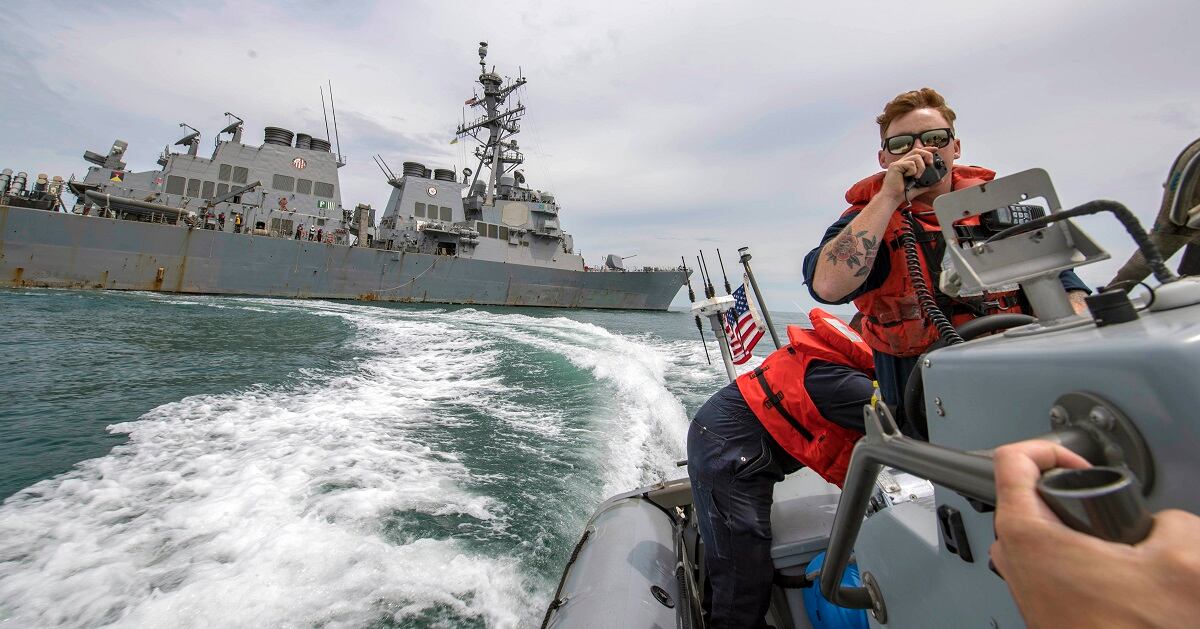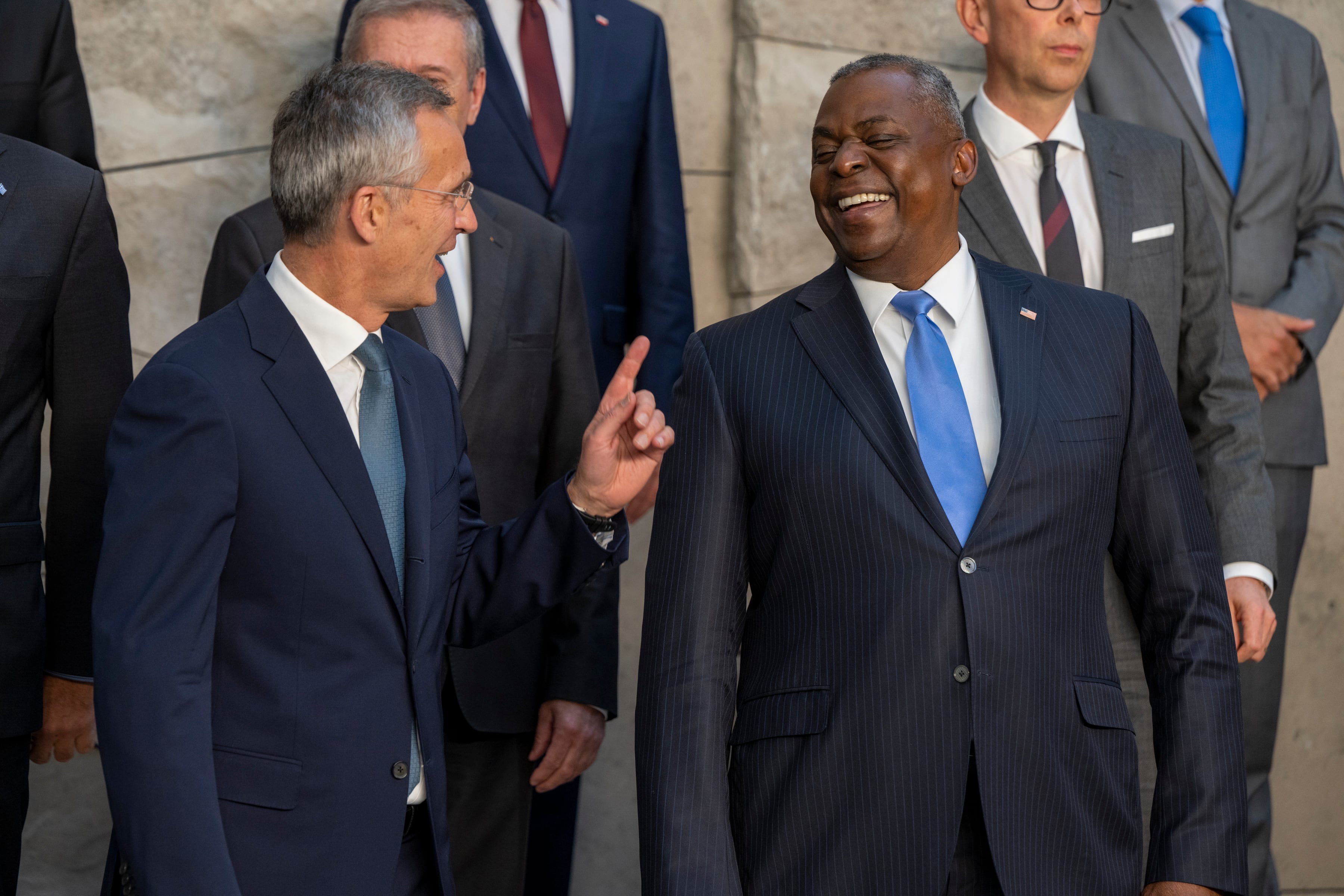WASHINGTON ― On a single day last week, 40 Russian warships staged a mock landing in Crimea, 20 Russian fighters and bombers repelled a notional enemy from landing on the Crimean coast ― and U.S. Defense Secretary Lloyd Austin began the first leg of his trip to Black Sea nations.
With the high-profile trip to Georgia, Ukraine and Romania, Austin signaled the Biden administration sees the Black Sea as a front to confront Russia, though he didn’t spell out a plan to do so. Austin and his aides used the visits to voice public support and, in private meetings, encourage security cooperation among NATO allies Romania, Turkey and Bulgaria ― and aspirants Georgia and Ukraine.
“The security and stability of the Black Sea are in the U.S.’s national interest and critical for the security of NATO’s eastern flank,” Austin said Oct. 20 in Romania. “The region, it goes without saying, is vulnerable to Russian aggression.
“We’ve seen evidence of that by ongoing actions in eastern Ukraine, the occupation of parts of Georgia, and the militarization of the Black Sea and provocative actions in the air and at sea.”
The overlapping activities highlight the Black Sea as a flashpoint in tension between Russia and the West. Now a maritime front line, it’s seen as a strategic crossroads between Europe and Asia, a nexus for energy routes, and a springboard for Russia to project power into the Eastern Mediterranean, the Levant and the Atlantic Ocean, according to the European Policy Center’s Ionela Ciolan.
On the day of Austin’s visit to Romania, two Russian Su-30 jets scrambled to intercept two American B-1B bombers and two KC-135 tanker aircraft over the waters of the Black Sea “to identify the air targets and prevent a violation of Russia’s state border,” according to the Russian government news agency Tass.
RELATED

Russian Deputy Foreign Minister Alexander Grushko said separately on Rossiya-24 TV that NATO was attempting to turn the Black Sea into an arena of confrontation. “This is an extremely dangerous path fraught with the risk of military incidents and escalation,” he said.
Against this backdrop, the Senate’s Europe and regional security subcommittee is holding a Black Sea-focused hearing on Wednesday, whose title says it’s aimed at “Reviving U.S. Policy Toward the Region.” Witnesses will likely face questions about whether an overt presence is warranted there just as the U.S. drawdown in Afghanistan has sparked conversations in Congress about where military resources can be applied next.
Russian troops occupy two Georgian breakaway regions, and Russia has been in a tug-of-war with Ukraine since it annexed the Crimean Peninsula in 2014. Georgia and Ukraine want to join NATO, but their territorial conflicts are an obstacle.
Russia massed 100,000 troops near Ukraine’s border this past spring, its Black Sea fleet launched live-fire naval exercises and its conflict with Ukraine grinds on. Meanwhile, the West lacks a strategy to stop it all, said retired Lt. Gen. Ben Hodges, who formerly led U.S. Army forces in Europe.
“It’s clear the Russians will only stop when they are stopped, and so I’m saying: ‘What’s our strategy? What do we want to accomplish there?’ The Russians are already aggressive in every domain,” Hodges said.
Hodges recommends Black Sea states allied with the West band together and advocate for themselves in NATO deliberations, as Baltic Sea allies did before they won a more robust NATO presence. The Biden administration is right to try to foster cooperation, he added.
“Even Turkey would be outmanned and outgunned in almost all categories by Russian Federation forces and efforts and resources,” Hodges said. “But if Ukraine, Romania, Georgia, Turkey and Bulgaria were all working together in terms of sharing intelligence, of developing unmanned maritime systems, doing things to make [Russia’s] Black Sea Fleet uncomfortable ... that’s the kind of thing the United States should be encouraging.”
RELATED

Cooperation in this region is complicated, according to senior defense officials. International agreements only allow littoral states to base warships on the Black Sea, which excludes the U.S. and all but three NATO members ― Romania, Bulgaria and Turkey. And those countries don’t always see eye to eye.
NATO allies Bulgaria and Romania have forged airspace-sharing agreements, and Romania focused on pooling intelligence and hosting exercises. However, Turkey, which dominates the Black Sea, has historically been reluctant toward a Western military presence there and shares friendlier relations with Russia than with most of its NATO allies.
“There have always been some concerns about the historic relationship between Bulgaria and Turkey, so I think they’re just trying to work out how it works: command and control, coordination, sharing intelligence,” a Pentagon official said. “They are working through those sorts of issues.”
For now, American and other NATO navies routinely operate in the Black Sea, and allied forces conduct air-policing missions over the area, some from Mihail Kogalniceanu Air Base, Romania, which Austin visited last week.
Austin’s trip raised questions for him and NATO Secretary General Jens Stoltenberg about whether either would beef up Western forces on the Black Sea, but neither had anything to announce.
“We have increased our presence in the region ― in the air, at land and at sea, and we are constantly assessing what more we can do, partly by increasing the presence but also partly by increasing our ability to quickly deploy forces if needed,” Stoltenberg said.
Joe Gould was the senior Pentagon reporter for Defense News, covering the intersection of national security policy, politics and the defense industry. He had previously served as Congress reporter.








